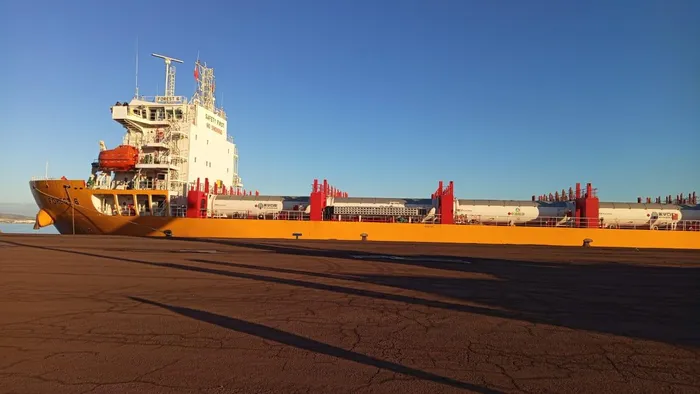Avedia Energy marks milestone with first import of liquefied petroleum gas in Western Cape
ENERGY

Avedia Energy, a South African-registered LPG company, in an interview with Business Report on Wednesday said that they had received their first delivery of imported liquefied petroleum gas (LPG), which was received at their Saldanha facility in the Western Cape.
Image: Supplied
Avedia Energy has made a significant move in the country's energy landscape by receiving its first delivery of imported LPG at their facility in Saldanha Bay, Western Cape.
This milestone by the South African-registered liquefied petroleum gas (LPG) company marks a promising new chapter in the LPG market that aims to provide cleaner energy sources to lower-income households.
In an interview with Business Report on Wednesday, Avedia's managing director Atose Aguele expressed enthusiasm over the delivery of LPG in Isotainers.
“We also have LPG pipelines that are under construction in Saldanha Bay. However, we are pleased to have received our first Isotainers,” Aguele said.
“This will be a game changer for LPG, as it currently is expensive, and with us entering the market, we expect that we will provide LPG at a reduced cost, especially to lower-income households.”
Aguele said that the current demand for LPG in South Africa amounted to 350 000 million tons (mt) per annum, of which 100 000mt was utilised in the Western Cape.
“The anticipated growth in the LPG market over the next five years is in the region of 50%. Saldanha Bay is expected to comprise 16% of the LPG market in the Western Cape," he said.
Aguele added that South Africa makes use of approximately 500 000 tons of gas and their entry into the LPG market was needed.
For many lower-income households, LPG serves as a vital resource for cooking, yet its rising costs have led many to resort to paraffin—an alternative that poses significant health and safety risks, particularly in township communities.
Aguele underscored the advantages of LPG, noting its cleaner credentials and versatility.
“LPG is a clean gas and is definitely much better to use. It can also be used in the agriculture industry and industrial processes.”
With the mission of making LPG more accessible, Avedia Energy’s Saldanha Bay facility is set to supply three provinces: the Western Cape, Eastern Cape, and Northern Cape.
“We are pleased that we are going to help businesses save costs on LPG. Previously a business in the Western Cape if they had a shortage of LPG, they would have had to transport the gas all the way from Richards Bay in KZN to the Western Cape, and you can imagine the costs of transporting it that distance. We are pleased with the amount of savings that businesses can now actually experience,” he said.
“We believe that there needs to be more competition, and our entry into the market was important as there were not enough suppliers of LPG, especially in the Western Cape area, where there wasn’t a lot of LPG available.”
Business Report previously reported that Avedia’s entry to the market was directed at addressing the inadequacies of the existing production and support infrastructure.
Located in Airport Industria, Cape Town, Avedia Energy has established a state-of-the-art bottling plant alongside an 8 000-ton LPG import terminal in Saldanha Bay—the first of its kind along the Western Cape coast.
Ruse Moleshe, managing director of RUBK, an energy and infrastructure consulting and advisory firm, said that it was important to increase the supply of LPG related infrastructure to support securing energy supply to the economy.
“LPG is used in commercial and industrial operations, as well as to meet heating and cooking needs for households. The demand for it has been outstripping supply. Additional imports could alleviate that problem,” Moleshe said.
“Refinery capacity in the country, the source of LPG, is limited due to the shutdown of Sapref and Natref refineries, and when any of the two operational ones,which is Astron (Western Cape) and Natref (Sasolburg), are shut down for maintenance, the impact on supply is more constrained.”
Moleshe added that key advantages of LPG use were its efficiency and being relatively cleaner than coal and charcoal that are used for indoor heating in domestic settings.
“Avedia’s imports are thus a welcome addition to alleviate such problems. LPG costs are potentially higher in industry (where the costs of LPG are not regulated) when supply is constrained,” she said.
“In the long run, increasing supply could also contribute to local manufacturing of cylinders, thus contributing to employment and economic development. The facilities in Saldanha Bay will also allow third-party access for other role players, thus opening up the market further to other role players.”
BUSINESS REPORT